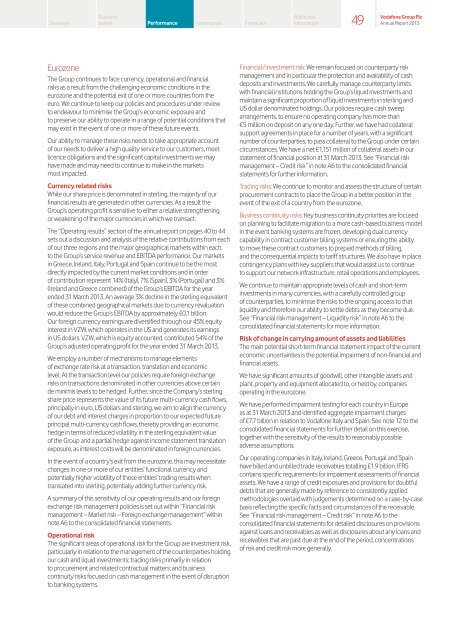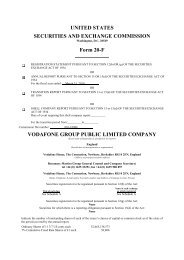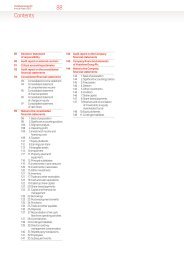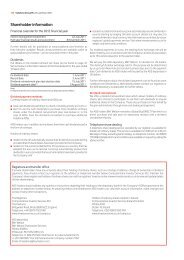The way ahead? - Vodafone
The way ahead? - Vodafone
The way ahead? - Vodafone
You also want an ePaper? Increase the reach of your titles
YUMPU automatically turns print PDFs into web optimized ePapers that Google loves.
Overview<br />
Business<br />
review Performance Governance Financials<br />
Eurozone<br />
<strong>The</strong> Group continues to face currency, operational and financial<br />
risks as a result from the challenging economic conditions in the<br />
eurozone and the potential exit of one or more countries from the<br />
euro. We continue to keep our policies and procedures under review<br />
to endeavour to minimise the Group’s economic exposure and<br />
to preserve our ability to operate in a range of potential conditions that<br />
may exist in the event of one or more of these future events.<br />
Our ability to manage these risks needs to take appropriate account<br />
of our needs to deliver a high quality service to our customers, meet<br />
licence obligations and the significant capital investments we may<br />
have made and may need to continue to make in the markets<br />
most impacted.<br />
Currency related risks<br />
While our share price is denominated in sterling, the majority of our<br />
financial results are generated in other currencies. As a result the<br />
Group’s operating profit is sensitive to either a relative strengthening<br />
or weakening of the major currencies in which we transact.<br />
<strong>The</strong> “Operating results” section of the annual report on pages 40 to 44<br />
sets out a discussion and analysis of the relative contributions from each<br />
of our three regions and the major geographical markets within each,<br />
to the Group’s service revenue and EBITDA performance. Our markets<br />
in Greece, Ireland, Italy, Portugal and Spain continue to be the most<br />
directly impacted by the current market conditions and in order<br />
of contribution represent 14% (Italy), 7% (Spain), 3% (Portugal) and 3%<br />
(Ireland and Greece combined) of the Group’s EBITDA for the year<br />
ended 31 March 2013. An average 3% decline in the sterling equivalent<br />
of these combined geographical markets due to currency revaluation<br />
would reduce the Group’s EBITDA by approximately £0.1 billion.<br />
Our foreign currency earnings are diversified through our 45% equity<br />
interest in VZW, which operates in the US and generates its earnings<br />
in US dollars. VZW, which is equity accounted, contributed 54% of the<br />
Group’s adjusted operating profit for the year ended 31 March 2013.<br />
We employ a number of mechanisms to manage elements<br />
of exchange rate risk at a transaction, translation and economic<br />
level. At the transaction level our policies require foreign exchange<br />
risks on transactions denominated in other currencies above certain<br />
de minimis levels to be hedged. Further, since the Company’s sterling<br />
share price represents the value of its future multi-currency cash flows,<br />
principally in euro, US dollars and sterling, we aim to align the currency<br />
of our debt and interest charges in proportion to our expected future<br />
principal multi-currency cash flows, thereby providing an economic<br />
hedge in terms of reduced volatility in the sterling equivalent value<br />
of the Group and a partial hedge against income statement translation<br />
exposure, as interest costs will be denominated in foreign currencies.<br />
In the event of a country’s exit from the eurozone, this may necessitate<br />
changes in one or more of our entities’ functional currency and<br />
potentially higher volatility of those entities’ trading results when<br />
translated into sterling, potentially adding further currency risk.<br />
A summary of this sensitivity of our operating results and our foreign<br />
exchange risk management policies is set out within “Financial risk<br />
management – Market risk – Foreign exchange management” within<br />
note A6 to the consolidated financial statements.<br />
Operational risk<br />
<strong>The</strong> significant areas of operational risk for the Group are investment risk,<br />
particularly in relation to the management of the counterparties holding<br />
our cash and liquid investments; trading risks primarily in relation<br />
to procurement and related contractual matters; and business<br />
continuity risks focused on cash management in the event of disruption<br />
to banking systems.<br />
Additional<br />
information<br />
49<br />
<strong>Vodafone</strong> Group Plc<br />
Annual Report 2013<br />
Financial/investment risk: We remain focused on counterparty risk<br />
management and in particular the protection and availability of cash<br />
deposits and investments. We carefully manage counterparty limits<br />
with financial institutions holding the Group’s liquid investments and<br />
maintain a significant proportion of liquid investments in sterling and<br />
US dollar denominated holdings. Our policies require cash sweep<br />
arrangements, to ensure no operating company has more than<br />
€5 million on deposit on any one day. Further, we have had collateral<br />
support agreements in place for a number of years, with a significant<br />
number of counterparties, to pass collateral to the Group under certain<br />
circumstances. We have a net £1,151 million of collateral assets in our<br />
statement of financial position at 31 March 2013. See “Financial risk<br />
management – Credit risk” in note A6 to the consolidated financial<br />
statements for further information.<br />
Trading risks: We continue to monitor and assess the structure of certain<br />
procurement contracts to place the Group in a better position in the<br />
event of the exit of a country from the eurozone.<br />
Business continuity risks: Key business continuity priorities are focused<br />
on planning to facilitate migration to a more cash-based business model<br />
in the event banking systems are frozen, developing dual currency<br />
capability in contract customer billing systems or ensuring the ability<br />
to move these contract customers to prepaid methods of billing,<br />
and the consequential impacts to tariff structures. We also have in place<br />
contingency plans with key suppliers that would assist us to continue<br />
to support our network infrastructure, retail operations and employees.<br />
We continue to maintain appropriate levels of cash and short-term<br />
investments in many currencies, with a carefully controlled group<br />
of counterparties, to minimise the risks to the ongoing access to that<br />
liquidity and therefore our ability to settle debts as they become due.<br />
See “Financial risk management – Liquidity risk” in note A6 to the<br />
consolidated financial statements for more information.<br />
Risk of change in carrying amount of assets and liabilities<br />
<strong>The</strong> main potential short-term financial statement impact of the current<br />
economic uncertainties is the potential impairment of non-financial and<br />
financial assets.<br />
We have significant amounts of goodwill, other intangible assets and<br />
plant, property and equipment allocated to, or held by, companies<br />
operating in the eurozone.<br />
We have performed impairment testing for each country in Europe<br />
as at 31 March 2013 and identified aggregate impairment charges<br />
of £7.7 billion in relation to <strong>Vodafone</strong> Italy and Spain. See note 12 to the<br />
consolidated financial statements for further detail on this exercise,<br />
together with the sensitivity of the results to reasonably possible<br />
adverse assumptions.<br />
Our operating companies in Italy, Ireland, Greece, Portugal and Spain<br />
have billed and unbilled trade receivables totalling £1.9 billion. IFRS<br />
contains specific requirements for impairment assessments of financial<br />
assets. We have a range of credit exposures and provisions for doubtful<br />
debts that are generally made by reference to consistently applied<br />
methodologies overlaid with judgements determined on a case-by-case<br />
basis reflecting the specific facts and circumstances of the receivable.<br />
See “Financial risk management – Credit risk” in note A6 to the<br />
consolidated financial statements for detailed disclosures on provisions<br />
against loans and receivables as well as disclosures about any loans and<br />
receivables that are past due at the end of the period, concentrations<br />
of risk and credit risk more generally.











